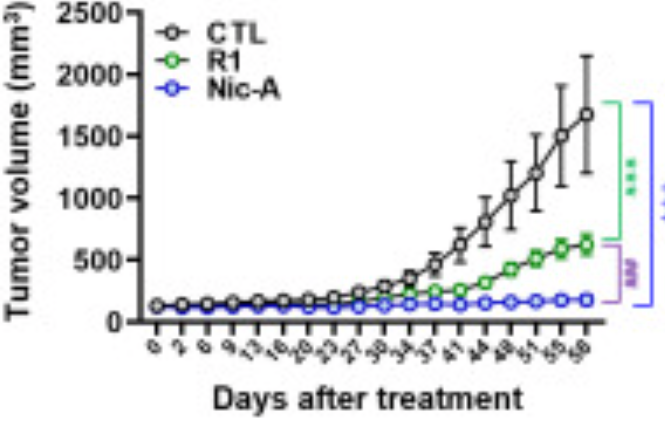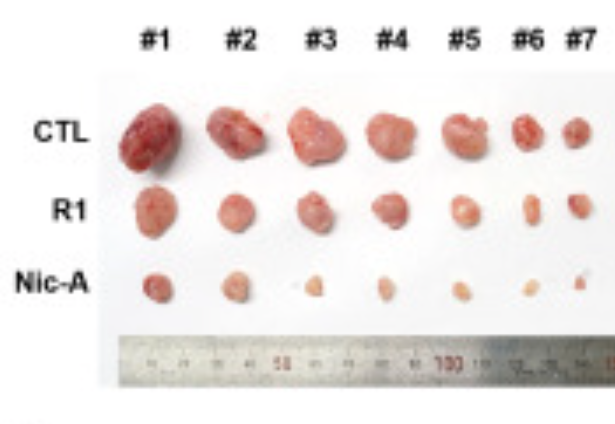Niclosamide reduces serotonin and glutamate
-
I might have to change my opinion on Niclosamide. Today I woke up weighing 850g less! So not only did it not lead to weight gain when binging the same day, butit lead to drastic weight loss the next day.
The effects seemed to last quite long. As I felt warmer the day after and as I said sleep was great as well.
It seems to good for liver fuction. So maybe I'll do small (~ 25mg), infrequent doses for liver health regularly. -
They're catching up! They're using A combo of niclosamide and acetazolamide to treat cancer.
https://pmc.ncbi.nlm.nih.gov/articles/PMC10214212/ -
https://www.mdpi.com/2073-4425/14/12/2196
The weight loss is likely due to glycogen depletion and the water associated with it. What's worse, the use of niclosamide has been observed to lower CO2 levels and increase LDH levels. This makes the use of carbonic anhydrase inhibitors even more justified when taking niclosamide.
..Meanwhile, exposure to NIC resulted in a decrease in the liver glucose (Glu) level, gut cholesterol (CHO), and glycogen (Gln) and triglyceride (TG) content in all examined tissues. Conversely, it led to an increase in tissue lactic acid (LA) and acetyl-CoA levels, as well as LDH activity."
,,It is hypothesized that NIC has the ability to disrupt the process of mitochondrial oxidative phosphorylation via uncoupling. In the case of tapeworms (Cotugnia digonopora), exposure to NIC led to the accumulation of lactate, decreased production of CO2, and reduced glycogen levels, indicating a potential impairment in aerobic ATP synthesis"
-
@war4512 I’ll read more about niclosamide today because it seems to me that a single study is not necessarily conclusive on this matter. Especially since it was a study conducted on carp.
-
@war4512 said in Niclosamide reduces serotonin and glutamate:
@war4512 I’ll read more about niclosamide today because it seems to me that a single study is not necessarily conclusive on this matter. Especially since it was a study conducted on carp.
Agreed.
Of course there is glycogen depletion at first when you increase your metabolism. But if that was the cause the weight loss would have shown the next day and not the day after that . Plus glycogen is quickly refilled when having meals.The opposite of what you said concerning glycogen might even be what's happening.
Subjectively I notice that I can go alittle longer between meals and my muscles look fulller.The paragraph you quoted merely describes how niclosamide kills parasites.
Yes that happens through uncoupling, and yes if we uncoupled our metabolism too much we would die too (ever heard of DNP?) .
That does not make physhological ucoupling unhealthy . the lowering of ATP is made up for by increases in temperature and metabolism and reduction in oxidative stress.I suggest you read about the basics and benefits of uncoupling and their effects on humans. Georgi has a lot of good content on that.
-
@Mauritio said in Niclosamide reduces serotonin and glutamate:
Of course there is glycogen depletion at first when you increase your metabolism. But if that was the cause the weight loss would have shown the next day and not the day after that . Plus glycogen is quickly refilled when having meals.
Well, if you've noticed that your muscles are fuller, it’s probably because you are compensatorily consuming large amounts of glucose. T3 also has some ability to reduce glycogen, but this depends on the dose and metabolism. When I take thyroid hormones, I also notice that I’m fuller, but that’s because I consume around 600/700g of carbohydrates a day, which has a compensatory effect.
@Mauritio said in Niclosamide reduces serotonin and glutamate:
I suggest you read about the basics and benefits of uncoupling and their effects on humans. Georgi has a lot of good content on that.
I’m familiar with the process of uncoupling. It’s an extraordinary mechanism, but as I mentioned, it depends on the substance or another physiological factor that induces it. PUFA, for example, also promote uncoupling, but through PPAR-gamma, impairing biogenesis, which T3 does not do. However, if there is a noticeable increase in lactate, it is probably related to limiting OxPHOS, resulting in increased glycolysis.
@Mauritio said in Niclosamide reduces serotonin and glutamate:
The paragraph you quoted merely describes how niclosamide kills parasites.
Yes that happens through uncoupling, and yes if we uncoupled our metabolism too much we would die too (ever heard of DNP?) .I fully agree, however, the pharmacological action of niclosamide on parasites should also have systemic effects. I didn’t say that mitochondrial uncoupling is bad – it depends on the substance that causes it. For example, T3 also uncouples mitochondria, but it has a beneficial effect. There are also uncoupling substances that cause negative symptoms.
-
@war4512 said in Niclosamide reduces serotonin and glutamate:
Well, if you've noticed that your muscles are fuller, it’s probably because you are compensatorily consuming large amounts of glucose.
As i said susected its probably from higher glycogen synthesis, which was almost twice as high.
"Moreover, the NEN-treated mice exhibited higher glycogen synthesis rates (Table 1), which were further confirmed by a direct measurement of glycogen synthesis showing higher rates in both liver and muscle (data not shown)."
https://pmc.ncbi.nlm.nih.gov/articles/PMC4299950/ -
Here are a few resources for further reading on uncoupling
"When mitochondria are “uncoupled,” they produce more carbon dioxide than normal, and the mitochondria produce fewer free radicals. Animals with uncoupled mitochondria live longer than animals with the ordinary, more efficient mitochondria, that produce more reactive oxidative fragments. One effect of the high rate of oxidation of the uncoupled mitochondria is that they can eliminate polyunsatured fatty acids that might otherwise be integrated into tissue structures, or function as inappropriate regulatory signals."
Ray Peathttps://lowtoxinforum.com/threads/vos-uncoupling-thread.5037/
https://lowtoxinforum.com/threads/uncoupling-increases-t3.40540/
-
@Mauritio said in Niclosamide reduces serotonin and glutamate:
They're catching up! They're using A combo of niclosamide and acetazolamide to treat cancer.
https://pmc.ncbi.nlm.nih.gov/articles/PMC10214212/@cs3000 have you seen this one ?
If I understand correctly they created a new molecule containing both niclosamide and acetazolamide,which has potent anti-tumour effects .Again it's the combination of an acetazolamide with an mTOR Inhibitor, in this case niclosamide, that has superior effects.
The same was seen in a other study I think you posted, with rapaymcin and acetazolamide.

-
Inhalable spray-dried dry powders combining ivermectin and niclosamide to inhibit SARS-CoV-2 infection in vitro
https://www.sciencedirect.com/science/article/abs/pii/S0378517325001383
-
@Mauritio amazing result . tho in supp materials didnt show much effect for the lung tumor metastasised for some reason
https://pubmed.ncbi.nlm.nih.gov/27153561/
(increasing apoptosis with the lowered pH from co2, or reversing hypoxia, then inhibiting proliferation further , but not always,
are some exceptions like with certain tumors characterized by poor immune cell infiltration, carbonic anhydrase inhibition doesnt help because even less immune infiltration with the lower pH, but a general approach) -
Niclosamide has excellent safety profile. They gave humans up to 1600mg daily and they observed no major side effects.
I'm taking about 50mg . -
@Mauritio hmm i read a trial where they gave 500mg x3 and had to stop the study because of side effects , but another trial didnt, maybe it was the timeframe not sure but it has some mutagenic effects , those are megadoses tho
low dose orally took out an antibiotic resistant strain of Enterococcus bacteria in mice https://pmc.ncbi.nlm.nih.gov/articles/PMC5988938/figure/F4/
-
@cs3000 oh what were those side effects ?
Wow, niclosamide night be able to replace the low infrequent antibiotic dose peat recommend and the dosage wasn't even that high. Nice.
-
@Mauritio sorry if I missed it, but where do you get this stuff from?
-
@bio3nergetic it's OTC in Germany. You can get 4 500mg pills for like 15€ ,which should be enough to try it out. For me that's like 40 dosages so will last quite a while.
It's called yomesan. -
@Mauritio said in Niclosamide reduces serotonin and glutamate:
yomesan
Thanks, I'll look into US options.
-
@Mauritio You have me curious, have you tried this at all? Edit: You have, did you experience any mental benefits?
-
@Mauritio said in Niclosamide reduces serotonin and glutamate:
@bio3nergetic it's OTC in Germany. You can get 4 500mg pills for like 15€ ,which should be enough to try it out. For me that's like 40 dosages so will last quite a while.
It's called yomesan.Inflation is real on this one.
In 2021: 5 tablets 6€
2025: 4 tablets 15€Had to look up my old post on it lol
Post in thread 'Niclosamide for fat loss/ uncoupling' https://lowtoxinforum.com/threads/niclosamide-for-fat-loss-uncoupling.42781/post-718904 -
@alfredoolivas yes you can look up my posts on the thread on the rpf on it.
And I still experience increased mood and energy on it. Im figuring out the dosage.
50mg seemed to be too much . 25 too little and today I took 35mg . Which seems to be a good mix.So 35mg, 1-2/week might be a good protocol.